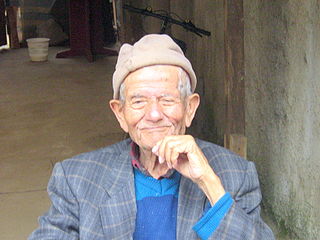Related Research Articles

Happiness is a positive and pleasant emotion, ranging from contentment to intense joy. Moments of happiness may be triggered by positive life experiences or thoughts, but sometimes it may arise from no obvious cause. The level of happiness for longer periods of time is more strongly correlated with levels of life satisfaction, subjective well-being, flourishing and eudaimonia. In common usage, the word happy can be an appraisal of those measures themselves or as a shorthand for a "source" of happiness. As with any emotion, the precise definition of happiness has been a perennial debate in philosophy.
Positive psychology studies the conditions that contribute to the optimal functioning of people, groups, and institutions. It studies "positive subjective experience, positive individual traits, and positive institutions... it aims to improve quality of life."

Gratitude, thankfulness, or gratefulness is a feeling of appreciation by a recipient of another's kindness. This kindness can be gifts, help, favors, or another form of generosity to another person.
The hedonic treadmill, also known as hedonic adaptation, is the observed tendency of humans to quickly return to a relatively stable level of happiness despite major positive or negative events or life changes.
Contentment is a state of being in which one is satisfied with their current situation, and the state of affairs in one’s life as they presently are. If one is content, they are pleased with their situation and how the elements in one’s life are situated. Contrary to popular belief, it is possible to be content with one’s life regardless of the circumstance, regardless of whether things are going as one expected or not.

The Annual Review of Clinical Psychology is a peer-reviewed academic journal that publishes an annual volume of review articles relevant to clinical psychology. It was established in 2005 and is published by Annual Reviews. The co-editors are Tyrone D. Cannon and Thomas Widiger. As of 2023, Annual Review of Clinical Psychology is being published as open access, under the Subscribe to Open model. As of 2023, Journal Citation Reports gave the journal an impact factor of 18.4, ranking it first out of 131 journals in the category "Psychology, Clinical " and fourth out of 81 journals in the category "Psychology (Science)".
Edward Francis Diener was an American psychologist and author. Diener was a professor of psychology at the University of Utah and the University of Virginia, and Joseph R. Smiley Distinguished Professor Emeritus at the University of Illinois, as well as a senior scientist for the Gallup Organization. He is noted for his research over the past thirty years on happiness, including work on temperament and personality influences on well-being, theories of well-being, income and well-being, cultural influences on well-being, and the measurement of well-being. As shown on Google Scholar as of April 2021, Diener's publications have been cited over 257,000 times.
Despite a large body of positive psychological research into the relationship between happiness and productivity, happiness at work has traditionally been seen as a potential by-product of positive outcomes at work, rather than a pathway to business success. Happiness in the workplace is usually dependent on the work environment. During the past two decades, maintaining a level of happiness at work has become more significant and relevant due to the intensification of work caused by economic uncertainty and increase in competition. Nowadays, happiness is viewed by a growing number of scholars and senior executives as one of the major sources of positive outcomes in the workplace. In fact, companies with higher than average employee happiness exhibit better financial performance and customer satisfaction. It is thus beneficial for companies to create and maintain positive work environments and leadership that will contribute to the happiness of their employees.

Sonja Lyubomirsky is a Russian-born American professor in the Department of Psychology at the University of California, Riverside and author of The How of Happiness: A Scientific Approach to Getting the Life You Want.
Robert Biswas-Diener is a positive psychologist, author and instructor at Portland State University. Biswas-Diener's mother is Carol Diener and his father is Ed Diener, both psychologists.
Kennon Marshall Sheldon is a professor of psychological sciences at the University of Missouri in Columbia, Missouri. His research is in the areas of well-being, motivation, self-determination theory, personality, and positive psychology. In 2002 he was a recipient of a Templeton Foundation "Positive Psychology" prize and in 2014 received the Ed and Carol Diener award for mid-career achievement in personality psychology. He is the author of Optimal Human Being: An Integrated Multi-level Perspective, Self-determination Theory in the Clinic: Motivating physical and mental health, and has written and edited several other academic books, as well as more than 200 academic articles and book chapters.

Happy is a 2011 documentary film directed, written, and co-produced by Roko Belic. It explores human happiness through interviews with people from all walks of life in 14 countries, weaving in the newest findings of positive psychology.
Life satisfaction is the evaluation of a person's quality of life. It is assessed in terms of mood, relationship satisfaction, achieved goals, self-concepts, and self-perceived ability to cope with life. Life satisfaction involves a favorable attitude towards one's life—rather than an assessment of current feelings. Life satisfaction has been measured in relation to economic standing, degree of education, experiences, residence, and other factors.
Subjective well-being (SWB) is a self-reported measure of well-being, typically obtained by questionnaire.
Ruut Veenhoven is a Dutch sociologist and a pioneer on the scientific study of happiness, in the sense of subjective enjoyment of life. His work on the social conditions for human happiness at Erasmus University Rotterdam in the Netherlands has contributed to a renewed interest in happiness as an aim for public policy. He has shown that happiness can be used a reliable measure to assess progress in societies which was one of the sources of inspiration for the United Nations to adopt happiness measures as a holistic approach to development. Veenhoven is the founding director of the World Database of Happiness and a founding editor of the Journal of Happiness Studies. He has been described as "the godfather of happiness studies", and "a leading authority on worldwide levels of happiness from country to country", whose work "earned him international acclaim".
Todd Barrett Kashdan is an American psychologist. He is a professor of psychology and director of the Well-Being Laboratory at George Mason University. His research explores why people suffer, with an emphasis on the transition from normal to pathological anxiety. Other research explores the nature of well-being, with an emphasis on the critical functions of curiosity, meaning and purpose in life, and psychological flexibility to human performance.
Maximization is a style of decision-making characterized by seeking the best option through an exhaustive search through alternatives. It is contrasted with satisficing, in which individuals evaluate options until they find one that is "good enough".
The World Happiness Council is a think tank of politicians and researchers based in the United Arab Emirates, intended to promote happiness and subjective well-being through the identification of public policy for policymakers worldwide and the standardization of happiness as a measure to guide governments.
Well-being is a multifaceted topic studied in psychology, especially positive psychology. Biologically, well-being is highly influenced by endogenous molecules that impact happiness and euphoria in organisms, often referred to as "well-being related markers". Related concepts are eudaimonia, happiness, flourishing, quality of life, contentment, and meaningful life.
Time affluence is defined as the sense that one has ample time available on a daily basis.
References
- 1 2 3 4 5 6 Compton, William C (2005). "1" . An Introduction to Positive Psychology. Wadsworth Publishing. pp. 1–22. ISBN 0-534-64453-8.
- ↑ "Adam Grant".
- ↑ "Home".
- ↑ "Sonja Lyubomirsky: Positive Psychology Laboratory". Archived from the original on 2011-08-08. Retrieved 2011-01-28.
- ↑ "Learn more | Authentic Happiness".
- ↑ "Barry Schwartz: Homepage".
- ↑ Kennon M. Sheldon Curriculum Vita